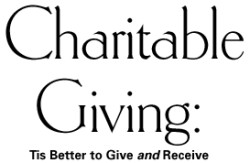 by Jeffery D. Katz With tax time nearly upon us, and charities banging down doors looking for new donors, new contributions, and new monies tomaintain programs, individual and corporate donors are often left in the lurch as to how to fund their favorite charitablepursuit, and derive the greatest tax benefit. As you sit down to do your taxes this year, you may think to yourself: “Could Ihave given more to charity and less to the government?” In a word—Yes.  In addition, states that impose income taxes generally allow charitable gifts as a deduction from the tax base. 1. The Basics: Cash contributions to qualified charities are generally allowed as an itemized deduction by individuals. Themaximum charitable deduction in any one year is limited to 50% of the taxpayer’s adjusted gross income (AGI) when gifts ofcash are made to public charities, churches, and similar organizations. Excess contributions may be carried forward to futuretax returns for up to five years. Taxpayers must itemize deductions in order to claim a charitable contribution deduction.Depending on what you’ve given, and who you’ve given it to, you may not be able to claim the deduction in whole or part. 2. Benefiting a charity while achieving tax breaks is an attractive proposition, but achieving maximum benefit requiresknowledge of the rules and advance planning. Gifts of appreciated property (such as securities) typically bring the donor a tax deduction for the full fair-market value ofthe securities, without the donor recognizing any income on the appreciation. If the fair-market value of your securities isless than the original cost, you may be better advised to sell the security and donate the proceeds, as no tax would berealized on the sale (appreciated property is property that has a current fair-market value that is higher than cost or basisin the property). With the recent decline in stock market valuations over the last year, charities have begun to receive more and more donationsin the form of tangible personal property. Where gifts of cash or securities are not right for you, you may want to consider agift of appreciated tangible personal property. If you’ve lost interest in your once-prized collection of Fabergé eggs, anddon’t want to sell the collection on EBAY, pay special attention— this column was written just for you. Your charitable deduction will depend on whether the appreciated property is ordinary income property or capital gainproperty. Ordinary income property is property that, if sold at its fair-market value on the date of contribution, would giverise to ordinary income or short-term capital gain. The deduction for such property is limited to the fair-market value of theproperty less the amount that would be ordinary income. Such property includes inventory and stock in trade, artworks andmanuscripts created by the donor, letters and memoranda, and capital assets held for less than one year. Capital gain propertyincludes any asset on which a long-term capital gain would have been realized if the taxpayer had sold the asset for itsfair-market value on the date of contribution. As a general rule, gifts of capital gain property are deductible at theirfair-market value on the date of contribution.  In general, your deduction for ordinary income property is limited to your basis or cost. For example, say you are a glassmanufacturer, and you bought a supply of glass five months ago for $5,000. It’s now worth $8,000. An immediate contribution ofthe glass would give you a deduction of $5,000, not $8,000. Now suppose the glass manufacturer bought a piece of glass morethan one year ago for $3,000 and again contributes it when it’s worth $8,000. Here, you normally would be able to deduct thefull $8,000. Plus, you would not be taxed on the $5,000 in appreciation. That is a far better result than if one sold theglass, paid tax on the gain, and contributed the remaining proceeds to charity. Special percentage limitations also come intoplay; if the property qualifies as capital gain property and it is real estate or stock, your deduction generally is limitedto 30 percent of your adjusted gross income unless you make a special election. What else can limit my deduction for a gift of tangible personal property? Use. If the property is held by the charity and is used by it in connection with the exempt purpose of the charity, then the fullfair market value of the property may be deducted by the taxpayer subject to the same limitations as contributions ofsecurities. However, the maximum amount of deductions for such contributions is limited to 30% of adjusted gross income ratherthan 50%. But watch out! If the property is not used by the charity in its exempt function (i.e., the charity sells it), thenthe amount of the deduction is limited to the cost of the property. Your deduction is also limited to basis in some casesincluding when you contribute tangible personal property that is put to an unrelated use by the charity. For example, if youcontributed a Fabergé egg to a hospital and the hospital used it for display, and in its Easter egg hunt, the use of the eggwould be unrelated to the hospital’s charitable purpose and your deduction would be limited to basis. On the other hand, aFabergé Egg contributed to an art museum and placed on display by it would not be an unrelated use and your deduction wouldnot be limited. Remember: If the property is held by the charity and is used by it in connection with the exempt purpose of the charity, thenthe full fair market-value of the property may be deducted by the taxpayer, subject to the same limitations as contributionsof securities. You should check with your accountant or tax advisor prior to engaging in any transaction. And remember, withboth Easter and tax time right around the corner, you’ll want to be careful where you leave your Fabergé eggs. Jeffrey D. Katz practices tax law and estate planning in Bethesda, Maryland(Jeffrey@jdkatz.com) 
|

